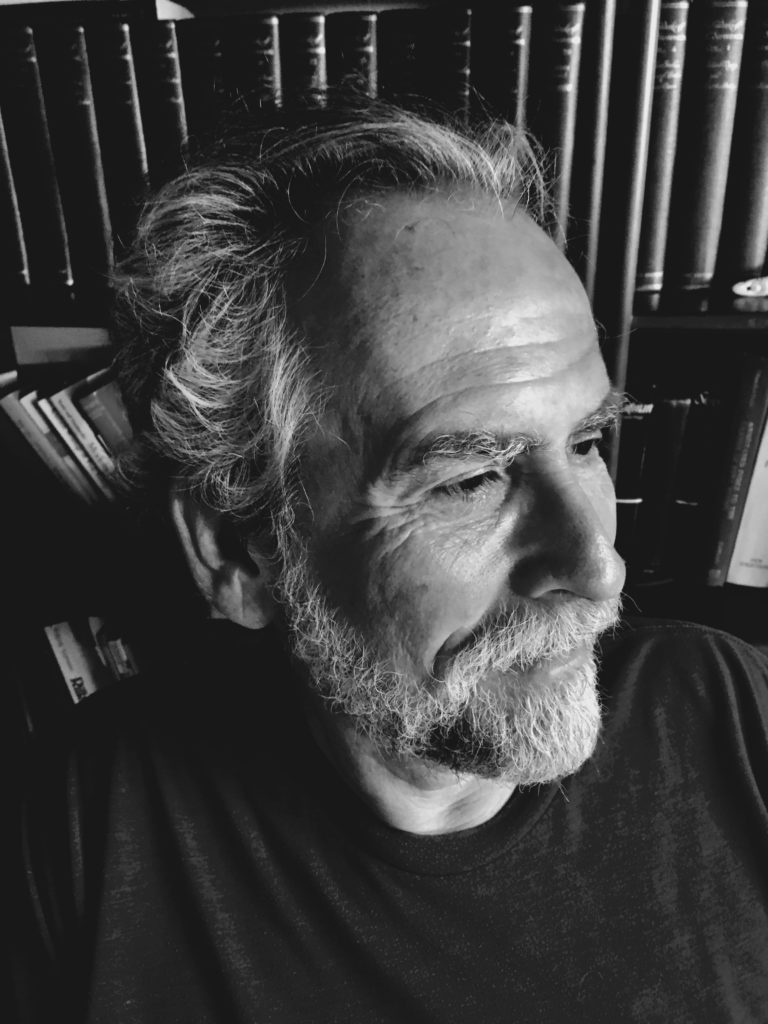George Franklin: se trataba de morir más despacio

Tres poemas de George Franklin
(Traducciones al español de Ximena Gómez)
Tratamiento
Mi padre tuvo quimioterapia
Por la tarde. Lo transporté allá,
Vi a los médicos sacar una bolsa
Llena de fluido sanguinolento
De su estómago, luego inyectar
El veneno que lo mantendría vivo
Por algo más de tiempo. Jamás
Lo había visto tan enflaquecido,
A excepción de su vientre inflado
Que se tensaba como un tambor,
Como una pelota de dolor, hasta
La próxima semana de tratamiento.
Se trataba de morir más despacio,
De aferrarse a este mundo al cual
Cada mañana pertenecía menos,
De volver del sueño hasta el día
En que no quisiera hacerlo más, ni ver
Su cara en el espejo volverse calavera.
Pero incluso entonces, quería vivir.
Treatment
My father had chemotherapy
In the afternoon. I drove him there,
Watched doctors draw off a bag filled
With bloody fluid from his stomach,
Then inject the poison that would keep
Him alive a little longer. He
Was thinner than I’d ever seen him,
Except for his bloated abdomen
That would grow taut, drum-like, a ball of
Pain, until the next week’s treatment. It
Was all about dying more slowly,
Clinging to this world he was less a
Part of every morning, coming back
From sleep until the day he wouldn’t
Want to come back anymore, see his
Face turning to skull in the mirror—
But even then, he wanted to live.
“Así”
Sola, suena como el nombre
De un dios egipcio que fuese
Adorado por bibliotecarios,
Por eruditos en lenguas antiguas.
Pero nunca está sola, relaciona
Proposiciones de filosofía
Con hechos, con un limón seco
Estriado, con un tazón de porcelana
Azul rajado, con la luz que se inclina,
Al crepúsculo entre las nubes:
Como una conduce a la otra así,
Garabateada en papiros, esta noción
Milagrosa de que la razón rige el mundo,
Un rey benevolente con uñas largas
Y corto de vista, al que el tiempo,
Su hermano, celoso y despiadado,
Obedece órdenes,
Aunque a regañadientes. Así,
Fue el cuadrado de la hipotenusa,
Igual a la suma de los cuadrados de
Los otros lados. Así, nuestra carne roída
Por el gusano caerá de nuestros huesos.
Así, mi último pensamiento será
El roce de tu mano en mi brazo,
Tu risa fácil.
“Thus”
Standing alone, it sounds like the name
Of an Egyptian god, one who might
Be worshipped by librarians and
Scholars of ancient languages. But,
It never stands alone. It connects
Propositions of philosophy
To fact, to a dry wrinkled lemon,
A cracked blue porcelain bowl, the light
That angles through the clouds at sunset—
How one thing leads to another thus,
Scratched into papyrus, this notion,
Miraculous, that reason rules the
World, a benevolent king with long
Fingernails and weak eyesight, that time,
His jealous, unforgiving brother
Obeys, albeit reluctantly,
His orders. Thus, was the square of the
Hypotenuse equal to the sum
Of the other sides’ squares. Thus, will the
Worm-gnawed flesh fall away from our bones.
Thus, will my last thoughts be of your hand
Touching my arm, your easy laughter.
Mientras leo a Pavese en Takee-Outee
El ventilador negro del rincón
Barre el aire caliente de un lado a otro
De la habitación. Estoy sentado cerca
De la puerta, incomodo, esperando
El pollo del General Tso y el arroz,
Y leyendo “La puta campesina” de Pavese.
Un nuevo cliente en el mostrador
Hace su pedido y se sienta. Es una
Noche de verano. Las estrellas
Empiezan a aparecer en el oriente.
Pienso en Pavese mientras vagaba
Por las aldeas, más allá de Turín,
O bebía sorbos de grappa con una
De sus acompañantes, los dedos finos
De una mujer le rozaban el dorso
De la mano. Alcanzo a ver la luna llena
Sobre el aparcamiento, las siluetas
De las copas de los árboles, más oscuras
Que el cielo oscurecido. Luces fluorescentes
Zumban y titilan, sobre el enfriador,
Lleno de botellas plásticas de refrescos.
¿Qué es lo que quiero de Pavese?
Probablemente lo mismo que él quería
De Whitman o de Masters: que la geografía
Y el tiempo se derrumbasen en las palabras,
Tomar el ferri de Brooklyn a través del Po,
Mirar fijamente el Spoon River desde
La cúspide de una colina que da a Roma.
Quiero que Pavese me lleve de mesa en mesa,
Que me presente a sus amigos, a los miembros
Del partido que desafían a Mussolini,
A los profesores cansados, a los labriegos
Que leen a Dante mientras cortan pedazos
De sopressatta con una navaja, a la mujer
Que no lo espera cuando lo meten a la cárcel.
¿Qué quiero de Pavese? Quiero
Que no esté muerto, que no se hubiera
Tomado esas pastas para dormir,
Que no se hubiera silenciado.
El joven detrás del mostrador camina
Hacia mí, sosteniendo una bolsa marrón
Con el menú engrapado. -Pollo
Del General Tso y arroz, dice. A través
Del papel olfateo pollo frito y salsa.
-¿Cesare, compartirías esto conmigo?
Reading Cesare Pavese in Takee-Outee
The black fan standing in the corner
Sweeps the hot air from one side of the
Room to the other. I sit by the
Door, uncomfortable, waiting for
My General Tso’s chicken and rice,
Reading Pavese’s “The Country Whore.”
A new customer at the counter
Places his order and sits down. It’s
A summer evening. The stars are just
Becoming visible in the east.
I think of Pavese wandering
Through the villages outside Turin
Or sipping grappa with one of his
Companions, a woman’s delicate
Fingers touching the back of his hand.
I can see the full moon over the
Parking lot, silhouettes of treetops
Darker than the dark sky. Fluorescent
Lights buzz, flicker, over the cooler
Filled with plastic bottles of soda.
What is it I want from Pavese?
Probably the same thing he wanted
From Whitman or Masters, to collapse
Geography and time into words,
To take Brooklyn Ferry across the
Po, to stare at Spoon River from a
Hilltop overlooking Rome. I want
Pavese to take me from table
To table, introducing me to
His friends, party members who defy
Mussolini, exhausted teachers,
Farmworkers who read Dante as they
Cut pieces of soppressata with
A pocket knife, the woman who won’t
Wait for him when he’s thrown in prison.
What do I want from Pavese? I
Want him not to be dead, not to have
Taken those sleeping pills, gone silent.
The young man from behind the counter
Walks up to me holding a brown bag
Stapled with a menu. General
Tso’s chicken and rice, he says. Through the
Paper, I smell fried chicken and sauce.
Cesare, would you share this with me?
“Treatment” was published in Into the Void literary journal
“Thus,” was published in George’ poetry collection “Traveling for No Good Reason,” Sheila-Na-Gig Editions (2018).
“Reading Cesare Pavese in Takee-Outee,” was published in George’ poetry collection “Traveling for No Good Reason,” Sheila-Na-Gig Editions (2018)
George Franklin. El poemario más reciente de George Franklin, Traveling for No Good Reason, ganó el concurso Sheila-Na-Gig Editions y se publicó en el 2018. Su poemario bilingüe, Among the Ruins / Entre las ruinas, traducido por Ximena Gómez, también fue publicado en el 2018 por Katakana Editores. Poemas suyos han aparecido en varias revistas, como Into the Void, The Threepenny Review, Salamander, Pedestal Magazine, The Ekphrastic y Review Cagibi. Un volante de Broadsided Press será publicado en junio de 2019. Traducciones de sus poemas al español también han aparecido en Nagari, Alastor, Raíz invertida, Conexos y Carátula. George Franklin es abogado y ejerce el derecho en Miami. Es asesor jurídico para Exchange for Change, donde además imparte talleres de poesía en el Estado de La Florida.
George Franklin’s most recent collection, Traveling for No Good Reason, won the Sheila-Na-Gig Editions competition and was published in 2018. A bilingual collection, Among the Ruins / Entre las ruinas, translated by Ximena Gomez was also published in 2018 by Katakana Editores, and individual poems have appeared in various journals, including Into the Void, The Threepenny Review, Salamander, Pedestal Magazine, The Ekphrastic Review, and Cagibi. A broadside from Broadsided Press is forthcoming in June 2019. Spanish translations of his poetry have appeared in Nagari, Alastor, Raíz invertida, Conexos y Carátula. He also practices law in Miami, where he is the general counsel for Exchange for Change and teaches poetry workshops in Florida state prisons.
Ximena Gómez es psicóloga, poeta y traductora. Es colombiana y vive en Miami. Sus poemas han aparecido en varias revistas en español, como Nagari, Conexos, Círculo de Poesía, Carátula, Raíz Invertida, Ligeia y Espacio poético 4. Poemas suyos se ha publicado en versión bilingüe (inglés-español) en Sheila-Na-Gig, Cigar City Journal, Cagib, donde fue nominada para el premio: lo mejor de la red en el 2018 y en una próxima edición de The Laurel Review. Su poemario Habitación con moscas fue publicado por la Editorial Torremozas (Madrid 2016) y cuentos suyos en Nueva poesía y narrativa hispanoamericana del siglo XXI, Lord Byron Ediciones (Madrid 2017). Ximena es la traductora del poemario bilingüe de George Franklin Among the Ruins / Entre las ruinas editado por Katakana Editores (Miami 2018).
Ximena Gómez is a psychologist, a poet and a translator. She is Colombian and lives in Miami. Her poems have appeared in several magazines in Spanish, such as Nagari, Conexos, Círculo de Poesía, Carátula, Raíz Invertida, Ligeia and Espacio poético 4. Her poetry has been published bilingually (English-Spanish) in Sheila-Na-Gig, Cigar City Journal, Cagibi, where she received a nomination for a 2018 Best of the Net award, and in an forthcoming edition of The Laurel Review. Her collection «Habitación con Moscas» was published by Editorial Torremozas (Madrid 2016) and her fiction appeared in the “New Anthology of Poetry and Fiction of the XXI Century,” Lord Byron Ediciones (Madrid 2017). Ximena is the translator of the bilingual collection of George Franklin Among the Ruins / Among the ruins edited by Katakana Editores (Miami 2018).

